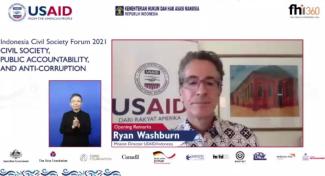JAKARTA – On March 24, 2021, the Mission Director of the United States Agency for International Development (USAID), Ryan Washburn, Coordinating Minister for Political, Legal, and Security Affairs, Prof. Mahfud MD, represented by the Deputy of National Unity of the Coordinating Ministry for Political, Legal and Security Affairs, Indonesia, Dr. Janedjri M. Gaffar, and KPK Commissioner, Lili Pintauli Siregar opened the second Indonesia Civil Society Forum (ICSF). In partnership with Indonesian civil society organizations, the Government of Indonesia and other development partners, the United States Government, through USAID and its civil society support initiative, MADANI, are hosting a two-day Indonesia Civil Society Forum (ICSF) on March 24-25, 2021.
The ICSF convenes representatives from civil society, government, and other partners to gather insights and perspectives on the role of civil society in Indonesian democracy. It aims to improve understanding of the capacity and sustainability constraints faced by Indonesian CSOs, particularly in light of the global COVID-19 pandemic, and to promote the sharing of innovations and best practices in promoting sustainable financing and capacity support for civil society organizations.
“Civil society organizations have time and again proven their valuable role as watchdogs and representatives of citizens’ interests – especially in light of the significant challenges we have faced during the COVID-19 pandemic” said Ryan Washburn, USAID Mission Director, in his remarks. “Through the United States Agency for International Development, the United States Government is proud to contribute to this forum. We are committed to supporting Indonesia’s democratic institutions, and we acknowledge and support the important role that civil society plays in a healthy, diverse, just, respectful, and tolerant democracy,” added Washburn.
The first ICSF was held in 2018 in Jakarta and was organized by USAID in collaboration with DFAT, GIZ, Ford Foundation, The Asia Foundation, GAC (Global Affairs Canada), and the Ministry of Law and Human Rights. More than 250 participants engaged in discussions centering on the capacity needs and sustainability of Indonesian CSOs. Two points of consensus emerged. The first was that civil society can contribute more to government accountability and community tolerance. The second was that there are still significant capacity gaps among many civil society organizations in Indonesia, especially at the local level. As a result, in 2019 USAID launched the five-year MADANI Civil Society Support Initiative that aims to build the capacity, legitimacy, and sustainability of local CSOs in 32 districts in six provinces.
This year, the ICSF will be held online and will engage 250 participants representing national and local civil society, government, academia, and other development partners through a combination of keynote speeches, moderated panel discussions, and facilitated breakout sessions addressing this year’s theme: “Civil Society, Public Accountability, and Anti-Corruption.” “Civil society organizations (CSOs) are organized citizens who act as the eyes and ears of the Corruption Eradication Commission (KPK) as well as the guards and reminders of the anti-corruption movement. CSOs are the vanguard and agents of change so that members of society can be active in combating corruption”, said Lili Pintauli Siregar, KPK Commissioner in her remarks.
Discussions on the first day will focus on the role of civil society in promoting accountability and transparency in fighting corruption. On the second day, the discussions will focus on recent trends in civil society and its operations.
Prof. Mahfud MD in his keynote speech which was conveyed by Dr. Janedjri M. Gaffar said, “With Indonesia’s recent decline in the Corruption Perception Index, it is important to explore the reasons for this decline and to identify the priorities for government action in the fight against corruption, specifically in the field of public procurement. The fight against corruption cannot only be the burden of the KPK [Corruption Eradication Commission] – it must be fought by us all. To reassert good governance, civil society must be on the frontlines of encouraging greater accountability and democratic governance in collaboration with state institutions. An active and empowered civil society and public is imperative to ensure the fight against corruption and against the abuse of public power is successful.”

Swiny Andina, USAID
